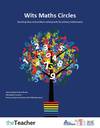Draft teaching units for Intermediate phase teacher education have been prepared by PrimTEd's Mathematics working group looking at developing a new teacher graduate’s ability to teach geometry and measurement. The units go beyond what is required by prescribed school curricula for the Intermediate Phase learners, but should allow pre-service teachers to be well equipped, and approach the teaching of Geometry and Measurement with confidence
A general guide that stresses a child-centred approach, thinking mathematically and emergent numeracy. Covers the main elements of the curriculum. Uses van Hiele’s levels of geometric reasoning. Makes somewhat labourious use of the term ‘social knowledge’.
A training manual for a workshop for lead teachers, originally prepared for the Gauteng Department of Education. Has many detailed illustrated examples and exercises.
Since 2011 the Department of Education has produced free Mathematics workbooks for all primary education schools. These can be downloaded from the DBE website.
A training manual for a workshop for lead teachers, originally prepared for the Gauteng Department of Education. Has many detailed illustrated examples and exercises.
A series of video programmes for use in initial teacher education produced by the Wits School of Education as part of a European Union funded project managed by the Department of Higher Education and Training
Zenex Foundation materials designed by SAIDE, Woz’obona and COUNT on Fundamentals for Mathematical Literacy at NQF Level One, in English. It uses a problem centred approach. The materials were originally designed for ECD practitioners studying at NQF Level 1 (meeting the requirements of eight NQF level 1 unit standards to gain a qualification in Mathematical Literacy - Unit Standards 7451, 7449, 7463, 7453, 7461, 7450, 7448, 7464, 7447). The materials may also be useful for those studying at NQF Level Four, who need a bridge to the study of mathematical literacy at that level. Zenex and SAIDE are of the strong view that these materials should only be trained by trainers who have an appropriate level of Mathematical Literacy themselves, and that these trainers should receive training in the use of the materials. The course comprises learner and trainer materials.









